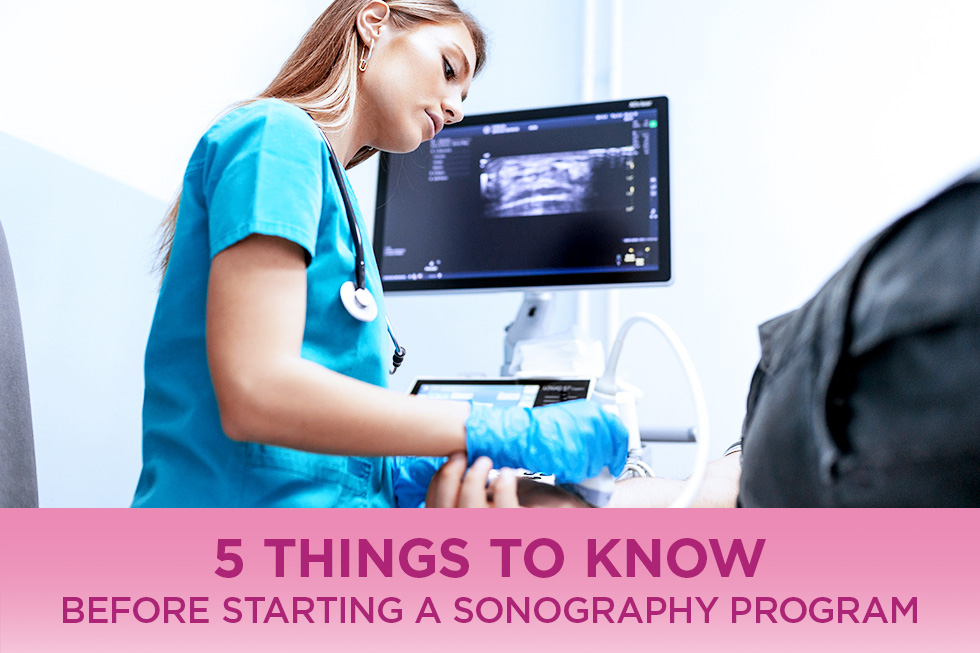Diagnostic medical sonography is a dynamic career choice that combines patient care with advanced imaging technology. If you’re considering a career in this field, there are several important things to know before starting a sonography program. Whether you’re drawn to the hands-on nature of the work or the opportunity to contribute to patient diagnoses, being informed can help you succeed from the start.
Sonographers use ultrasound equipment to capture images of the body, which physicians use to diagnose and monitor various conditions. The role requires a unique combination of technical skills, attention to detail, and patient communication. Enrolling in a sonography program is the first step toward entering this healthcare field, but it’s important to understand the expectations and commitments involved. In this blog, we’ll outline five things to know before starting a sonography program, helping you prepare for your educational journey and explore future opportunities in the healthcare field.
1. Sonography Requires Both Technical and Interpersonal Skills
Diagnostic medical sonography involves more than just operating equipment. Successful sonographers must be technically proficient while also demonstrating strong communication skills.
Students in a sonography program learn to use sophisticated imaging technology to capture clear, accurate images. This requires an understanding of anatomy, physics, and equipment settings. But beyond the technical aspects, sonographers must interact with patients who may be anxious, in pain, or unsure about their procedures. Explaining the process clearly and maintaining a calm, professional demeanor is just as important as capturing quality images.
Developing comfort with both patient care and technology can support your success in a sonography training program. Programs often include clinical components where students can practice both skill sets in real healthcare environments.
2. The Academic Experience
Sonography programs provide in-depth training to help you build the skills and confidence needed for your career. They typically cover subjects such as anatomy, physiology, medical terminology, ultrasound physics, and patient care.
In addition to classroom learning, students participate in labs and clinical rotations that reinforce hands-on skills. Because accuracy is critical in this field, there is a strong emphasis on detail, precision, and critical thinking. It’s important to be prepared for a focused learning experience.
Balancing coursework, clinical hours, and personal responsibilities may require planning and support from family or peers. Knowing this upfront can help set realistic expectations and reduce stress during the program.
3. Clinical Experience Is a Core Component
One of the most important aspects of a sonography program is clinical experience. Clinicals provide students with the opportunity to apply what they’ve learned in real-world healthcare settings under the supervision of experienced professionals.
During clinical rotations, students interact with patients, operate ultrasound machines, and observe how sonographers collaborate with other healthcare providers. This practical experience helps students apply their knowledge and continue building essential skills for future roles.
Clinical placements can vary by site and may involve different specialties such as obstetrics, abdominal imaging, or vascular sonography. Flexibility and professionalism are key to making the most of these opportunities.
4. Certification and Credentialing Are Important
After completing a sonography program, graduates often pursue professional certification to demonstrate their knowledge and may enhance their qualifications when pursuing employment opportunities.
To sit for these exams, graduates typically need to complete an accredited program and fulfill specific clinical hour requirements. Being aware of these requirements early can help students stay on track throughout their education.
Certification options can vary by specialization, such as abdominal, obstetric, or vascular sonography. Understanding which credentials align with your career goals can help you choose the right path.
5. Tips for Making the Most of Your Sonography Education
Maximizing your sonography education involves being proactive and taking ownership of your learning journey.
For New Students: Build a strong foundation in anatomy and physics early on. Don’t hesitate to ask questions or seek extra help if needed.
For Students with Families or Jobs: Create a schedule that balances study time with personal obligations. Look for programs with flexible components if needed.
For Hands-On Learners: Engage fully during labs and clinicals. Observing experienced sonographers can offer valuable insights.
Everyone’s experience will look different, but taking a thoughtful approach to your education may support academic progress and help build confidence as you continue through your program.
Education Matters: Choose a Program That Supports You
Choosing a quality sonography program can influence your educational experience and preparation for future opportunities. MedQuest College offers a Diagnostic Medical Sonography program designed to provide a solid foundation in both technical knowledge and hands-on experience.
The program combines classroom instruction with practical clinical training, helping students develop the skills needed for entry-level roles in diagnostic imaging. Instructors with real-world experience guide students through subjects such as ultrasound physics, abdominal imaging, and patient communication.
By offering a structured and supportive environment, MedQuest College aims to prepare students to take credentialing exams and explore opportunities in the healthcare field.
Why Consider MedQuest College for Sonography
Students in the Diagnostic Medical Sonography program benefit from:
- Clinical externship opportunities that provide hands-on experience.
- Small class sizes for personalized attention and support.
- Curriculum focused on real-world imaging applications.
- Guidance for professional certification preparation.
- Instructors who bring professional experience to the classroom.
This approach is intended to support students as they build their skills and gain familiarity with clinical environments.
Ready to Begin Your Sonography Journey?
If you’re considering a future in medical imaging, now is a great time to explore your options. Five things to know before starting a sonography program can help you prepare mentally, academically, and professionally for the road ahead.
MedQuest College’s Diagnostic Medical Sonography Program offers students the opportunity to build knowledge and practical experience relevant to entry-level roles in diagnostic imaging. Schedule a tour or request more information today to learn how we can support your educational journey.

